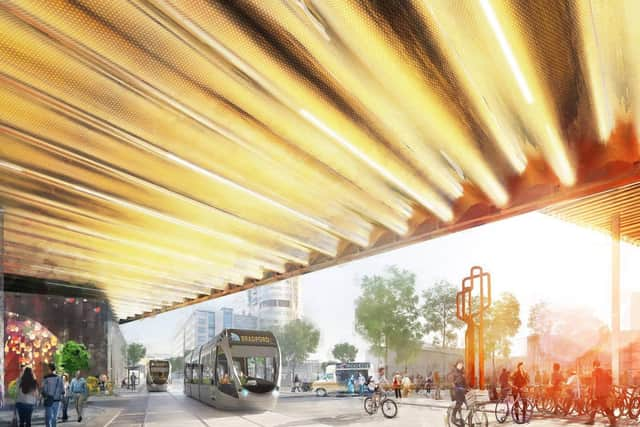West Yorkshire likely to pay for its long-awaited mass transit system through government's £4.2bn intra-city transport fund and not 'land value capture'
and live on Freeview channel 276
Ben Still, the managing director of the West Yorkshire combined authority, said the attempt to end Leeds's status as the biggest urban area in Western Europe without a metro system would likely need central government funding to pay for its capital costs.
The government has promised to invest £4.2bn in intra-city transport through a new fund and West Yorkshire leaders will be bidding for some of this funding next year. Mr Still said this would be a "key area we will be looking to exploit".
Advertisement
Hide AdAdvertisement
Hide Ad

Around the world similar schemes are often paid for with the help of land value capture, where infrastructure investment results in land around the development becoming more valuable. Transport bosses in London are looking to fund a significant portion of the Bakerloo line extension through housing development around stations.
But Mr Still said that while high commercial rents and high demand in central London meant such an idea could work in the capital, this was not the case across West Yorkshire so other funding sources would be needed.
Last month, West Yorkshire's leaders set out how a new mass transit system "integrated into the urban fabric of every community it serves" could be built in the county by 2040.
A new mass transit system serving the county's towns and cities could start construction by the mid-2020s as part of a wider programme of transport investment over the next 20 years, West Yorkshire Combined Authority said today.
Advertisement
Hide AdAdvertisement
Hide AdThe authority, which leads on transport and economic growth for Leeds, Bradford, Wakefield, Kirklees and Calderdale, is publishing its Connectivity Infrastructure Plan and Mass Transit Vision 2040 today and is asking people to have their say. Their plans were boosted in this week's Budget after the area was awarded £7.4m to develop its bid to be submitted to the Government next year.
West Yorkshire has some way to go to match Greater Manchester, where the Metrolink which opened in 1992 now has 99 stops and 123 trams, connecting population centres with employment and leisure destinations.
It has no operating subsidy and enough money is generated from fares to cover its operations and maintenance, the online event was told by a leading Manchester official.
Asked about how West Yorkshire would pay for its metro system, he said there would be "a set of different funding streams" and income from fares would not necessarily pay for the cost of building the scheme.
Advertisement
Hide AdAdvertisement
Hide AdHe said: "In terms of things like land value capture, that's something that both we've looked at the West Yorkshire context, and also transport for the North have looked at as well in terms of some of the major infrastructure there.
"And there's two issues, one is that if you do try and extract value out of in that way you can only use it once, so which tier of government will try and extract that value, second is that yes it might work well in central London where there is extremely high demand and extremely high commercial rents, that's not necessarily the case across all of West Yorkshire, so it will have a very limited role in the general mix of funding."
He added: "I'll end on a positive note, we are absolutely confident, it's very rarely the funding that causes the main problem. I think the other points about having strong support, having propositions that communities can get behind and that work well with local politics , that's going to be what's really going to make a difference here."
It is hoped that construction work could start on some elements of the project by 2025, though West Yorkshire officials are still looking at the best type of technology to use in the hope of creating a system that would "leapfrog" over other regions.
Advertisement
Hide AdAdvertisement
Hide AdShortly after the December 2019 General Election, Prime Minister Boris Johnson said his newly-elected government will "remedy the scandal that Leeds should be the largest city in Western Europe without light rail or a metro”.
A map setting out how the mass transit system could look shows plans for interchanges in West Yorkshire's biggest towns and cities as well as at smaller areas in between.
In Leeds, there is an opportunity for the mass transit system to go up to Alwoodley in the north of the city and Cross Gates to the east.
There are suggested stops in the centre of Bradford as well as in Shipley and Baildon, while the system would also serve Wakefield and its surrounding five towns of Pontefract, Castleford, Knottingley, Featherstone and Normanton.
Advertisement
Hide Ad